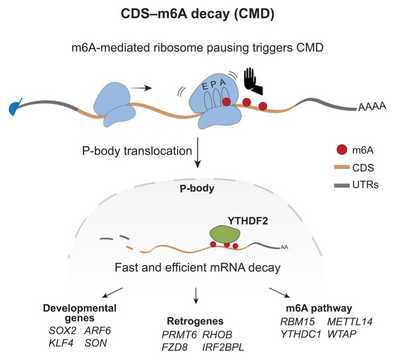RNA Modifications
N6-Methyladenosin (m6A) ist die vorherrschende interne RNA-Modifikation in eukaryotischen Boten-RNAs (mRNAs) und spielt eine entscheidende Rolle für die mRNA-Stabilität.

N6-Methyladenosine (m6A) is the predominant internal RNA modification in eukaryotic messenger RNAs (mRNAs) and plays a crucial role in mRNA stability. In this project, using human cells, we reveal that m6A sites in the coding sequence (CDS) trigger CDS-m6A decay (CMD), a pathway that is distinct from previously reported m6A-dependent degradation mechanisms. Importantly, CDS m6A sites act considerably faster and more efficiently than those in the 3′ untranslated region, which to date have been considered the main effectors. Mechanistically, CMD depends on translation, whereby m6A deposition in the CDS triggers ribosome pausing and transcript destabilization. The subsequent decay involves the translocation of the CMD target transcripts to processing bodies (P-bodies) and recruitment of the m6A reader protein YT521-B homology domain family protein 2 (YTHDF2). Our findings highlight CMD as a previously unknown pathway, which is particularly important for controlling the expression of developmental regulators and retrogenes.
This project was published in Zhou et al. 2024.









